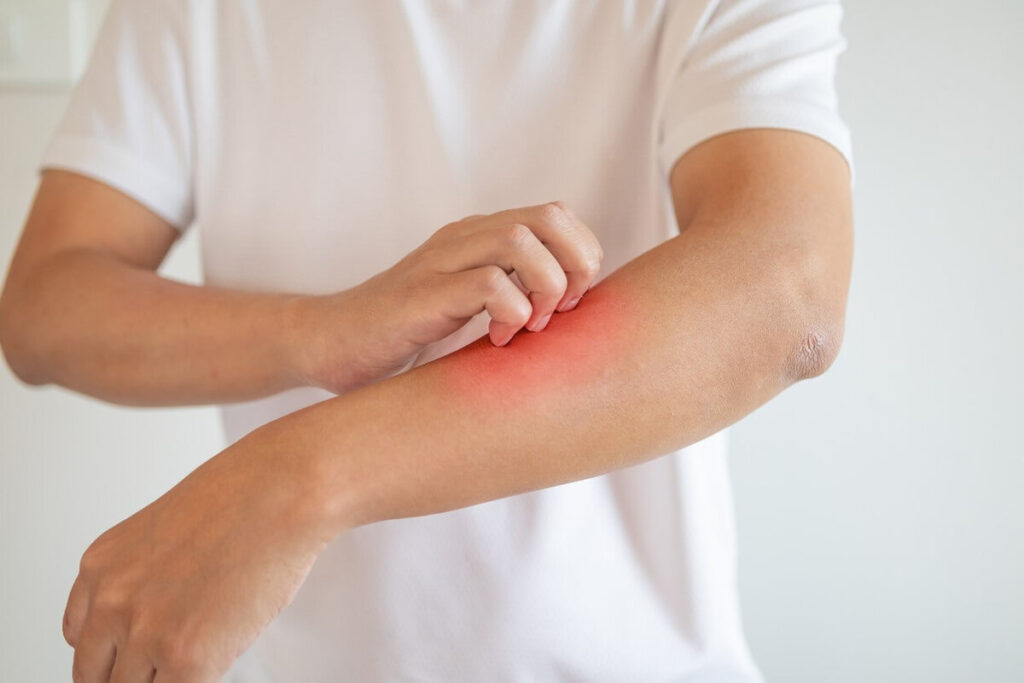Itchy skin is more than just an annoyance; it can interfere with sleep, affect your focus, and even signal an underlying medical issue.
If you’ve ever felt the overwhelming urge to scratch without knowing why, you may be dealing with a condition known as pruritus, the medical term for itchy skin.
Understanding this term and its causes can help you seek the right treatment and bring long-term relief.
What Is the Medical Term for Itchy Skin?
The medical term for itchy skin is pruritus, which comes from the Latin word prurire, meaning “to itch.” Pruritus can be localized (affecting one area) or generalized (affecting the whole body), and it may or may not be accompanied by a visible rash.
According to the American Academy of Dermatology (AAD), pruritus is one of the most common skin-related symptoms in the United States, especially among older adults.
It is a symptom, not a disease in itself, and may be linked to skin conditions, internal diseases, allergic reactions, or even psychological factors.
Click here to learn more about tiny bumps on the skin: causes and treatments.
What Causes Pruritus?
Pruritus can arise from a wide range of sources, including:
- Dry skin (xerosis) is one of the leading causes, especially in older adults or during colder seasons.
- Skin conditions: Eczema, psoriasis, hives, and fungal infections can all cause itching.
- Allergic reactions: These may result from soaps, laundry detergents, cosmetics, or certain foods.
- Systemic illnesses: Liver disease, kidney failure, thyroid issues, and iron deficiency anemia are often linked with persistent pruritus.
- Neurological problems: Conditions such as multiple sclerosis or nerve damage can trigger localized itching.
- Psychological triggers: Stress, anxiety, and depression may contribute to chronic itching without a physical cause.
A study in JAMA Dermatology (2021) linked chronic pruritus with increased psychological distress and sleep disruption, particularly in older adults, highlighting the importance of addressing it promptly.
Click here to learn more about skin rashes that itch: causes and treatments.
Symptoms and Diagnosis
While itching is the primary symptom, pruritus may also be accompanied by:
- Redness or inflammation
- Dry or cracked skin
- Blisters or bumps
- Thickened or leathery skin due to scratching
- Scabs or infections from prolonged irritation
Diagnosis usually begins with a physical examination and a review of your medical history. If the cause isn’t immediately obvious, your doctor may order blood tests, allergy testing, or even a skin biopsy to determine what’s behind the itching.
When talking to your healthcare provider, using the medical term for itchy skin, pruritus, can help convey that you’re aware and informed, which may improve communication and care.
Click here to learn more about mysterious skin trigger warnings.
How Is Pruritus Treated?
Treatment for pruritus depends on the underlying cause:
- Dry skin: Moisturizers containing ceramides or urea can help restore skin hydration.
- Allergies or irritation: Avoiding the trigger and using antihistamines or corticosteroid creams may relieve symptoms.
- Skin conditions: Eczema and psoriasis often require prescription ointments and careful skin care routines.
- Systemic diseases: Managing the root condition (e.g., liver disease or thyroid imbalance) often reduces the itch.
- Neuropathic causes: Medications like gabapentin or antidepressants may be recommended.
According to the American Medical Association, combining medical treatment with at-home care—such as cool baths, avoiding harsh soaps, and wearing loose-fitting clothes- can offer significant relief.
If you experience persistent or severe itching, don’t ignore it. Chronic pruritus can interfere with daily life and may indicate something more serious.
Click here to learn more about how to cure skin fissures.
FAQs About Medical Term for Itchy Skin
What is the medical term for itchy skin?
The medical term is pruritus.
Is pruritus always caused by a skin condition?
No. It can be due to internal illnesses, medications, or even stress.
Can dry skin alone cause pruritus?
Yes. Dry skin, especially in winter or in older adults, is a common cause.
Are there home remedies that help with itching?
Yes. Oatmeal baths, cool compresses, and unscented moisturizers may help.
When should I seek medical help for itchy skin?
If the itching lasts more than two weeks or is severe, you should see a doctor.
Can pruritus be cured permanently?
That depends on the cause. If it’s related to a treatable condition, long-term relief is possible.

